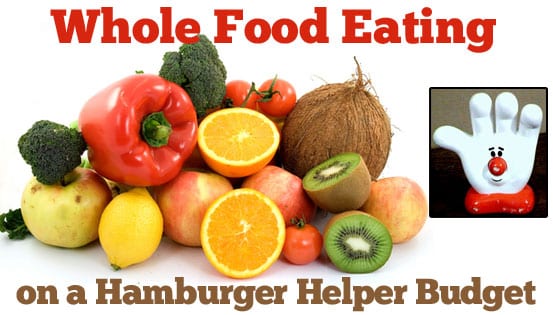Prioritizing Whole Food

Now that we have discussed the importance of whole foods, the next step in making them affordable is deciding which foods take top priority for purchase. Some things are definitely worth a little more money for infinitely greater nutrition, some things are much easier to save on. So which is which? Here is how I prioritize my grocery budget, and I hope it helps you to do the same.
-
Pastured, Organic & Local Beef, Eggs and Dairy
Beef : We buy our beef in bulk from a local farmer twice a year. It is a large expense upfront, but it is WELL worth it in the long run. Not only are we getting our beef for a fraction of grocery store price, but any store would be hard pressed to match the quality. My husband, who originally rolled his eyes at this idea, cooked store bought ground beef once time last year (organic, mind you) and said that it grossed him out so much that he vowed he would never let us run out of our grass-fed beef again! Eggs: These are generally pretty easy to find locally. There are many farmers who sell eggs fresh from their farms, where their chickens are pastured, free to eat all the bugs, grass and such that chickens are meant to eat. he result? A huge, gorgeous orange yolk and an egg that is nutritionally far superior to its grocery store counterparts! And the taste? No contest. Farm eggs win hands down, every time. Dairy: We prefer raw milk from a local farmer. There is a great deal of controversy surrounding raw milk, but the hard data fully supports its safety. In Alabama, sale of raw milk is legal as long as it is sold for ‘pet consumption’ and labeled as such. So go ahead, buy a gallon for your…um…dog. I guaranteed your ‘dog’ will never want to go back! I understand some people are not comfortable with raw milk, despite great evidence to its safety (even over pasteurized milk). If this is you, I recommend buy organic milk in the grocery store. It’s a better deal to do a store brand by the gallon, than to buy half gallons of ‘name brand organics’. As for the rest of our dairy:
Organic Conventional Yogurt Sour Cream Butter (Grass Fed is the key here) Cream Cheese Some Cheese & Cottage Cheese Some Cheese Earth Fare almost always has coupons available for these things, and often run specials on top of the coupons.
-
Chicken
Ideally, we like to buy chickens from a local farmer who pastures their hens. However, this can be a bit cost prohibitive. Our solution is to alternate between organic store bought chicken and pastured, local poultry. Costco carries whole organic chickens fairly cheap, as well as organic chicken breasts. Whole chickens give you far more bang for your buck, plus the benefit of bones to make stock with after the chicken is cooked and picked clean. Cooking a whole chicken in the crockpot and then making the stock from it is insanely easy and delicious. You will soon wonder why you ever did it any other way!
-
Organic, Local Produce
I am a huge fan of the farmer’s market! Not only can you buy great local, organic produce at an incredibly reasonable price, you will find some gems you wouldn’t even think to look for. Several small one-day-a-week markets are starting back up in the late spring, and these are my personal favorites. I also use this guide to help me decide which fruits and veggies are necessary to buy organic and which don’t really make much difference. It’s a lifesaver for the budget! Also, if time allows, growing a few veggies yourself in a garden is not only budget friendly, but an excellent way to spend time with your family outside, learning together and sharing the fruits of your labors.
-
Quality Grains
Moderation! It’s best to keep these to a minimum, but when buying bread, opt for whole grain, preferably multi-grain, free of preservatives and additional yuck such as HFCS and food coloring. Also, make the switch from white to brown rice (brown jasmine rice has a great flavor and is an easy transition) and cook it in your homemade stock to neutralize the phytic acid.
In the end, you will be surprised by how much money you save simply avoiding processed foods! It really frees up your grocery budget to buy higher quality foods. Try eliminating things bit by bit and replacing them with nutritionally superior alternatives. For example: When we decided to buy our raw milk from the farmer at $6 a gallon (which is about a dollar more than the grocery store organic milk and about two dollars more than conventional) we decided to cut out buying breakfast cereal, and we actually ended up saving money! Do this little by little and before your know it, you will be replacing the junk with whole foods and saving money in the process! Our next article in the series is all about sources and will be packed with information on buying local and saving!




